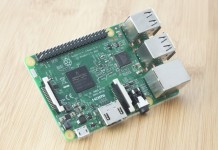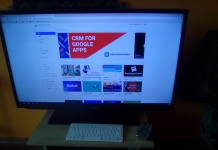 CNet has an article about Google’s stripped-down Chromebook laptops, and their placement in schools. In a speech at the Florida Educational Technology Converence yesterday, Rajen Sheth, Google’s leader of Chromebook work for business and education, announced that hundreds of schools across 41 states have outfitted at least one classroom with Chromebooks.
CNet has an article about Google’s stripped-down Chromebook laptops, and their placement in schools. In a speech at the Florida Educational Technology Converence yesterday, Rajen Sheth, Google’s leader of Chromebook work for business and education, announced that hundreds of schools across 41 states have outfitted at least one classroom with Chromebooks.
Three schools in Illinois, Iowa, and South Carolina will be outfitting all their students with the devices—over 27,000 in all. The schools appreciate the advantages the device offers of constant updates, cloud storage, and “invisibility” in terms of booting and use—teachers can focus on instruction rather than technical support.
Students do like tablets such as the iPad, but they seem to be taking to Chromebooks just as well.
"Students love the tablet. I am not going to hide that from you," said Diane Gilbert, an English teacher at Kelly Mill Middle School in Blythewood, S.C., who’s taught with tablets in her classroom. She added, though, that Chromebooks have a place: "They will bow down and kiss your feet for a tablet or for a [Chromebook]. But I’m a language arts teacher. My goal is to have students publish their work–create and publish. The [Chromebook] is more alike to a laptop or a desktop in the ability to publish."
Which type of device is better for education? The iPad will allow for interactive textbooks, but there’s no reason that such textbooks couldn’t be used on the Chromebook as well—indeed, Kno’s textbooks can be accessed from any web browser. And the Chromebook’s keyboard and Google Docs word processor means that students can write papers and other creative works on it much more easily than they could on the keyboardless iPad. At a suggested retail price of $349.99, the Chromebook is $150 cheaper than the basic iPad, too—a big savings when it comes to schools buying tens of thousands of them.

































This will be interesting to watch, especially from a privacy perspective. In the Google world, the customer is also the product. The ChromeBook is thoroughly tied to the Google ecosystem. Resistance is futile,all who enter become productized.
On the other hand, the iPad respects and protects your privacy. Because Apple isn’t monetizing your behavior, it costs a little more. It’s a clear value choice and we see what these school administrators are interested in. It’s a good thing that they can’t sell student labor as some jails and prisons used to do.
These look like pilot programs so there will be others that examine alternative solutions. Your tax dollars at work.
The Richland school district mentioned in the article has licensed Ericom AccessNow for VMware View for use along with their Chromebooks by its 30,000 students and staff. AccessNow for VMware View will be deployed across its 35 K-12 schools.
Ericom AccessNow for VMware View is a pure HTML5 RDP client that enables Chromebook users to connect to their VMware virtual desktops – and run those desktops in a browser. It does not require Java, Flash, Silverlight, ActiveX, or any other underlying technology to be installed on end-user devices – an HTML5 browser is all that is required.
For more information on this case study, visit:
http://www.ericom.com/pr/pr_111206.asp?URL_ID=708
Adam
Note: I work for Ericom